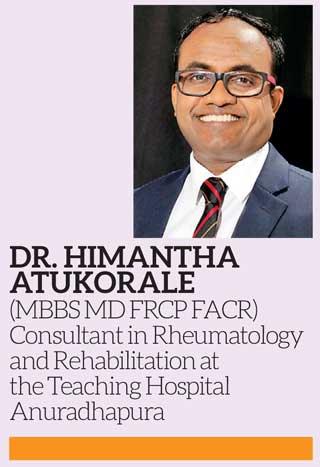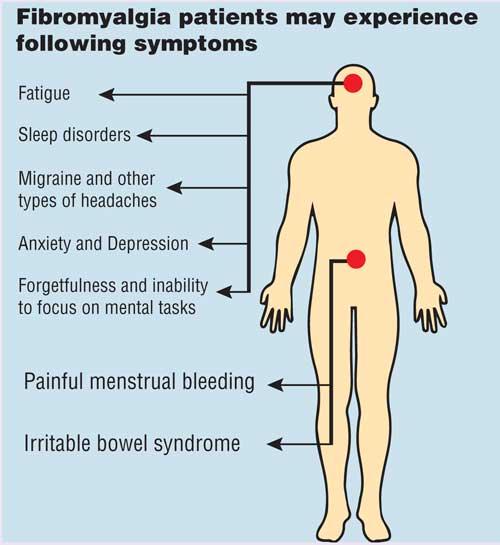Reply To:
Name - Reply Comment
Last Updated : 2024-05-29 00:01:00

 Are you experiencing constant muscle pains, sometimes so severe that you can’t perform your day-to-day tasks? Has it been progressing for months? If yes, it is very likely that you might be suffering from Fibromyalgia. In light of World Fibromyalgia Awareness Day, which was scheduled for May 12, the global community joined hands to raise awareness for fibromyalgia, an invisible and debilitating chronic condition.
Are you experiencing constant muscle pains, sometimes so severe that you can’t perform your day-to-day tasks? Has it been progressing for months? If yes, it is very likely that you might be suffering from Fibromyalgia. In light of World Fibromyalgia Awareness Day, which was scheduled for May 12, the global community joined hands to raise awareness for fibromyalgia, an invisible and debilitating chronic condition.
Fibromyalgia is a disorder characterised by widespread muscle pain accompanied by fatigue. “Muscle pain is the hallmark of this disease and it can be observed mostly among individuals between the ages of 20-50 years,” Consultant in Rheumatology and Rehabilitation at the Teaching Hospital Anuradhapura, Dr. Himantha Atukorale (MBBS MD FRCP FACR) said. He added that the disease is more commonly seen among women and the exact reasons for why it targets that specific age group or women in general has not been discerned yet.
 “We don’t know the triggering factors or causes for fibromyalgia but we have observed that a fraction of diagnosed patients suffer from other conditions such as arthritis as well. They have what we call secondary fibromyalgia where they suffer from arthritis first but lateron develop fibromyalgia,” Dr. Atukorale said.
“We don’t know the triggering factors or causes for fibromyalgia but we have observed that a fraction of diagnosed patients suffer from other conditions such as arthritis as well. They have what we call secondary fibromyalgia where they suffer from arthritis first but lateron develop fibromyalgia,” Dr. Atukorale said.
Moreover, he added that while the exact cause for the disease is unknown, experts believe that is associated with how our brain perceives pain. Accordingly, a light painful sensation on a normal person may feel like a severe stabbing pain in a patient with fibromyalgia. “The patients’ pain sensitivity is high and they would feel an unusual amount of pain for even a small stimulus,” he explained.
Identifying Fibromyalgia
Widespread muscle pain is the primary symptom of this disease and pain is observed in areas around your spine such as your lower back and the back of the neck and shoulders, certain areas of the arm, above the elbow, above the knee, etc. These painful areas are very tender to touch. In addition, Dr. Atukorale explained that patients may suffer from,
“This is a disease that is diagnosed by excluding other disease conditions. When a person comes in complaining about muscle pain, commonest reasons are viral diseases or leptospirosis or even severe arthritis. To diagnose fibromyalgia, muscle pain due to other reasons should be excluded. In diagnosis we usually expect the patient to have experienced at least 12 weeks of continuous muscle pain,” Dr. Atukorale said.
Managing the disease 
While there is no exact cure for fibromyalgia, there are many treatments available that can help manage the disease and continue your daily lifestyle at ease.The emphasis is on minimizing symptoms and improving general health. A variety of treatments can help reduce the effect that fibromyalgia has on your body and your life.
Physiotherapy- A physical therapist can teach you exercises that will improve your strength, flexibility and stamina. Hydrotherapy (water-based exercises), which is practiced in other countries, might be particularly helpful. Land-based exercises such as cycling or light exercises such as aerobics also help. “We expect patients to exercise through the pain to reduce their pain sensitivity,” Dr. Atukorale commented. Ideally, the patient should be monitored and be adviced to avoid strenuous exercise. In addition, heat therapy, ultrasound therapy and TENS (transcutaneous electrical nerve stimulation) therapy are also used to help patients manage their pain.
Occupational therapy-An occupational therapist can help you make adjustments to your work area or the way you perform daily tasks that will cause less stress on your body.
Non weight-bearing exercises- Exercises such as cycling and swimming are recommended, not as strenuous exercises but for about 20-30 minutes per day, five sessions per week.
Neuropathic medications- These medications reduce the pain signals that are travelling towards the brain.However, we avoid giving dosages that may lead to patients developing dependency on the drug.
Pain relievers- Traditional painkillers are not very helpful. Opioid medications such as tramadol and morphine are not recommended, because they can lead to significant side effects and dependence and will worsen the pain over time.
Antidepressants- If the depression component is significant, these medications may be prescribed.
“Fibromyalgia is undetected and underdiagnosed in Sri Lanka. There is a significant lack of awareness on the disease and spreading awareness is imperative to encourage patients to seek medical help,”
Dr. Atukorale concluded.

Add comment
Comments will be edited (grammar, spelling and slang) and authorized at the discretion of Daily Mirror online. The website also has the right not to publish selected comments.
Reply To:
Name - Reply Comment
For a long time, accusations have been made against Urban Development and Hou
The state-run loss-making State Mortgage & Investment Bank (SMIB) has reveale
US authorities are currently reviewing the manifest of every cargo aboard MV
On March 26, a couple arriving from Thailand was arrested with 88 live animal